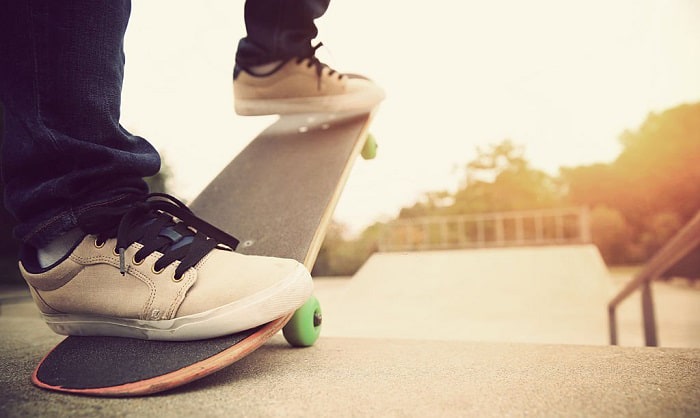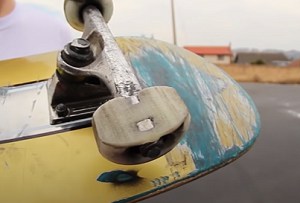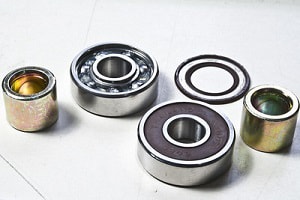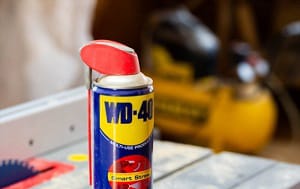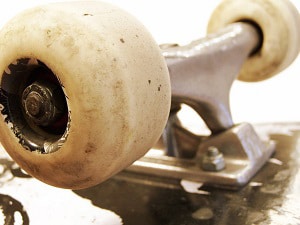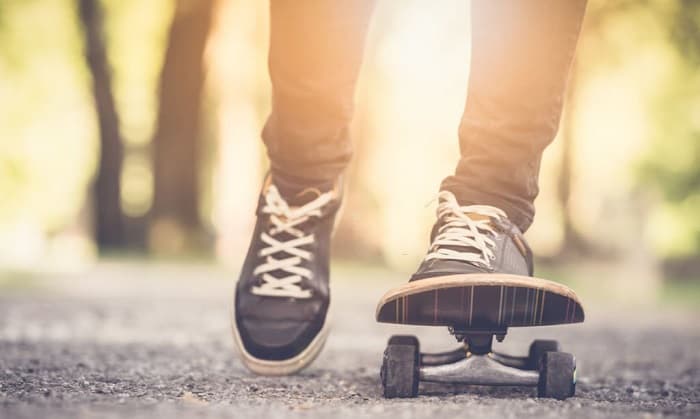It is normal to have issues with your skateboards, such as strange noises or squeaky skateboard trucks. They happen with skateboards either just freshly out of the box or after extended use. What we should do is find out the reasons for the noise and fix it.
So, why is my skateboard so loud? You might ask. You just need to assess your skateboard. It could be from dry bearings, unstable washers, flat-spotting on the wheels, damaged pivot cups and bushings, or loose screws.
Table of Contents
What Causes a Noisy Skateboard?
Let’s get into the most plausible reasons for loud skateboards. Plus, we’ll also come up with solutions to solve these problems.
1. Flat-spotting on the wheels
Bumpy and noisy rides are not our thing as skateboarders. This issue often comes from flat-spotting caused by power sliding.
There should be anticipation on your end that your wheels will soon begin to wear out. So, you might have to change the wheels after a while of sliding or grinding against the ground.
And while changing wheels may be costly, it will keep our skating smooth.
Some skateboarders consider scrapping the flat-spotted areas of the wheel, but this remedy doesn’t yield anything good.
2. Unfitted Washers
If you hear creaking sounds or skateboard wheels clicking when leaning, it’s often because of moving washers. And what causes it to move? It’s an oversized hole.
While buying washers of the appropriate size helps, there are still a few remedies you can perform before heading into the skate shop.
- Unscrew the kingpin
- Grab a Teflon or duct tape
- Wrap the kingpin threads to make them thick enough to fit the washer’s hole.
This solution may work for some time. But in no guarantee will last. The washer’s friction against the kingpin will wear out the Teflon or duct tape you applied. So, you might as well consider spending on a new set.
3. Damaged pivot cup and loose screws
Another reason why skateboards make loud noises when leaning is loose screws and pivot cup issues. For wobbly screws, there’s not much to do except tighten them.
If tightening your screws won’t do any trick, it might be pivot cups that need solutions. Here’s how we solve it.
- Step 1: Loosen the kingpin nut.
- Step 2: Pull the truck’s body out of the pivot hole.
- Step 3: Detach the pivot cup off the hanger and check for wear and tear.
- Step 4: Free the pivot hole from any gunk and apply lubricant.
- Step 5: Put the pivot cup back and assemble the entire truck.
- Step 6: Try doing a test ride to know if the problem persists.
If you see marks of wear and tear on the pivot cup, don’t compromise. It will be better to buy new pivot cups.
4. Dry bearings
We all have learned about maintaining skateboard bearings. And one of the instances that take us to these practices is the rattling noise they make from drying up. The best way to counter these problems is by cleaning the old ones. Here’s how:
- Step 1: Take the bearings off the wheels.
- Step 2: Detach the bearing shields
- Step 3: Soak the naked bearings in an acetone or alcohol solution.
- Step 4: Dry the wheel cores and poke any dirt left.
- Step 5: Apply silicone-based lubricant on the bearings.
- Step 6: Put the shields back and install the bearings on the wheels.
I once used water-based WD-40 on my bearings, but it only made my skateboard squeaky after a few days. So I don’t advise using this product on skate bearings.
5. Damaged bushings
Worn-out bushings are often the cause of loud skateboards. This instance can be due to wear-and-tear or weather factors. Whatever causes these issues, damaged bushings may still be repairable. Take note of these steps:
- Step 1: Unscrew the nut off the kingpin.
- Step 2: Pull the bushings out.
- Step 3: See for wear-and-tear marks or cracks on the bushing’s body.
- Step 4: Lubricate the bushing with a silicon-based lubricant. If there’s none, consider waxing it.
- Step 5: Re-install the bushings and assemble the entire truck.
- Step 6: Do a test ride to see if the skateboard sound weakens.
Should the bushings have cracks, it’ll be best to have them replaced.
Other Potential Reasons for Loud Skateboards
The things we discussed above are the most common issues associated with skateboards getting even too loud at night. Now, let’s discuss a few more that are considerable.
- A gap in the wheel seats – You might notice spaces between the bearing’s outer ring and the wheel’s skin inside. These gaps are inevitable and could enlarge. Then, your bearings might move in their seating and impose a slightly complicated issue.
- Riser pads – Riser pads only make noise under one circumstance; loose screws. However, if not functioning as intended, risers can cause vibrations and gradual damage to the deck. So, you might as well check on them regularly.
- Riding surface – A few skateboarders, especially the new ones, misinterpret the noise they hear when skating. Note that it’s not always the skateboard that’s loud. Sometimes, it’s how the board makes sounds based on the ground’s texture. Noisy skateboards when cruising on asphalt and other concrete surfaces are acceptable.
How Do I Manage My Skateboard’s Noise?
If you’ve been skating for months, you might have asked once, “why does my skateboard make weird noises just when I stand on it?” Here’re some solutions that could help reduce these loud sounds from skateboards.
- Lubrication is a gem – Lubricants smoothen the operation of the skateboard’s components. However, make sure the part is amenable to lubing before you apply. Also, never use water-based lubricants as these will only dry out the skateboard part.
- Use the most appropriate skateboard components – We can’t complain about noises on the road during cruising if we use the wrong wheelset. So, if, for example, your washers have oversized holes, you need to assess if buying a new one will suffice.
- Checking– Regular checking of your skateboard helps you apply concrete solutions before it makes squeaky sounds. Look for potential damages and wear and tear. Apply necessary repair to prevent further damage.
Conclusion
Skateboard parts need maintenance. But knowing when to perform it remains a question for some. Others will even have to wait until the skateboard makes squeaking and weird sounds to check it.
So, the next time you ask, “why is my skateboard so loud?” start checking on it. Several factors cause it, so it’s best to have them identified to apply the necessary solutions.

Hi, I am Charles Harris. I opened this site to write as much as I can about my biggest passion – skateboarding!
I started as a clumsy yet passionate rookie 10 years ago to now a still passionate yet much better skateboarder! But I have to tell you, the whole journey has always been fun and rewarding, indeed not without hardship.


